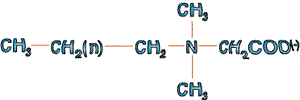Tension Superficial
TENSIOACTIVE MATERIALS
What is a tensioactive material?
Tensioactive materials, surfactants or active surface agents are chemical substances with a polar-non polar structure that affect surface tension. These substances have a tendency to locate themselves at the surface creating an adsorbed monomolecular layer on the interface that reduces the surface tension value.
How does a tensioactive material work?
Solutions of tensioactive materials are activated when the material places itself as a monomolecular layer absorbed on the surface between the hydrophilic and hydrophobic phases. Their location impeded the movement of molecules at the surface into the body of the fluid to attain a lower energy level, thus reducing surface tension.
See a simple experiment:
Video on the effects of tensioactive materials
Properties of tensioactive materials
The general behavior and properties of tensioactive agents are due to the dual character of their molecules (hydrophilic and lipophilic groups). The resulting antagonism between the two sections of the molecule and the equilibrium between them gives the compound it surface active properties.
Chemical behavior
The hydrophilic group affects the solubility and tends to result on a complete dissolution of the molecule. On the other hand, the hydrophobic group due to its insolubility tends to counteract the other's tendency. If equilibrium is reached the substance does not completely enter into solution. The substance concentrates on the interface with its molecules oriented in such a way that hydrophilic groups' orientation is towards the aqueous phase, and the hydrophobic groups' orientation is towards the vapor phase.
Classification of tensioactive materials
Tensioactive substances are classified by the power of dissociation in the presence of an electrolyte, its physical and chemical properties. There are two main categories:
Ionic: More on ionic substances
Non-ionic: More on non-ionic substances





 ionize in solution. The hydrophobic group becomes negatively charged. They are formed by an alquilic linear or branched chain between 10 and 14 carbon atoms. Some examples of this group are sulfates or sulfonates.
ionize in solution. The hydrophobic group becomes negatively charged. They are formed by an alquilic linear or branched chain between 10 and 14 carbon atoms. Some examples of this group are sulfates or sulfonates. are those that when dissolved ionize, resulting in a positively charged hydrophobic group of the molecule. An example of this group is Cetil Amonia Bromide, a quaternary amonioum compound or an amino fat disolved in an acid.
are those that when dissolved ionize, resulting in a positively charged hydrophobic group of the molecule. An example of this group is Cetil Amonia Bromide, a quaternary amonioum compound or an amino fat disolved in an acid. are those that act depending on the medium. In basic media they are anionic and in acid media they are cationic.
are those that act depending on the medium. In basic media they are anionic and in acid media they are cationic. Surfactants of non-ionic tensioactive substances are ionized through combined effects of weak hydrophilic solutes such as ether type bonds or hidroxil groups in its molecule. Examples are fatty alcohols of phenols to which one or several molecules of ethylene oxide are added. For example, etoxilated nonil phenol and etoxilated nonanol.
Surfactants of non-ionic tensioactive substances are ionized through combined effects of weak hydrophilic solutes such as ether type bonds or hidroxil groups in its molecule. Examples are fatty alcohols of phenols to which one or several molecules of ethylene oxide are added. For example, etoxilated nonil phenol and etoxilated nonanol.


